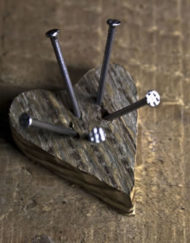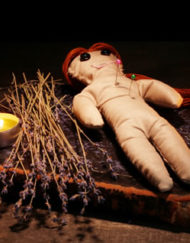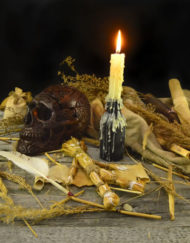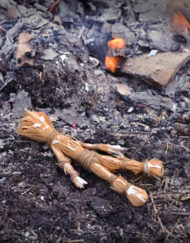Ogou in Haitian Voodoo
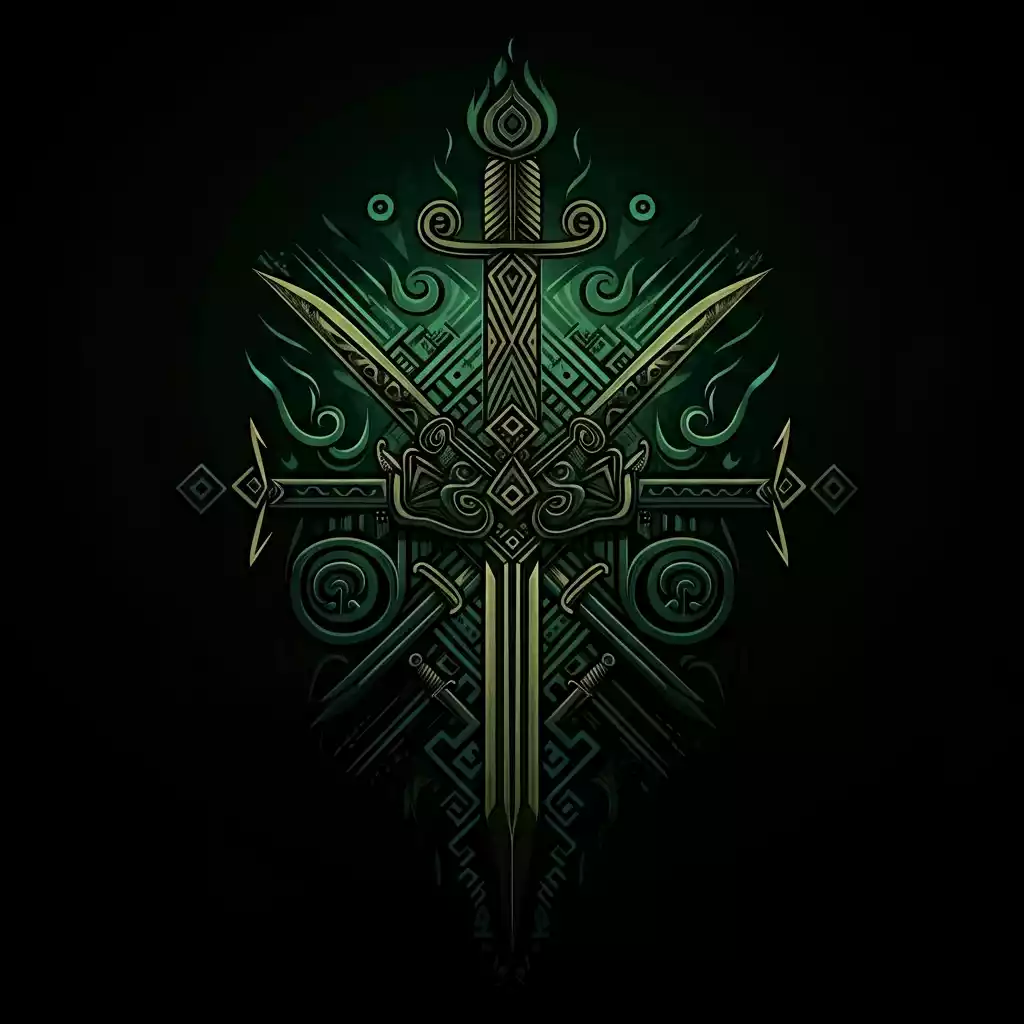
Within the vibrant and deeply spiritual world of Haitian Voodoo, Ogou (also known as Ogun) stands as a towering figure of strength, resilience, and protection. His influence extends far beyond hunting, war, and ironwork. Ogou is a patron of blacksmiths, the unemployed, and modern technology itself, embodying a blend of tradition and progress. This Lwa, both powerful and complex, carries the fire and steadfastness needed to cut through life’s challenges, but also the temper that can lead to destruction if not approached with respect.
Through this article, you’ll uncover more about Ogou’s origins, his multifaceted role in Haitian Voodoo, the rituals associated with him, and the lessons he offers followers. Whether you seek strength, guidance, or understanding, Ogou’s story is both inspirational and cautionary—a fiery mirror reflecting humanity’s will to thrive.
Who is Ogou?
Origins and Mythological Background
Ogou is deeply rooted in the Yoruba religion, where he is seen as one of the first Orishas to descend to Earth—a powerful warrior and blacksmith sent to shape the world into a habitable space for humanity. Although Ogou’s task remains unfinished, his presence continues to shape and inspire. He is often depicted wielding a sword or machete, drinking rum, and smoking tobacco, symbolic of both his fiery nature and his role as a revolutionary spirit.
Haitian Voodoo blended Ogou’s Yoruba origins with the lived experiences and struggles of enslaved Africans. Ogou became more than just a god of war and iron; he transformed into a leader of justice and liberation. This evolution positioned him as an enduring symbol of resilience, tied to significant moments in Haitian history, including the Haitian Revolution, where Ogou infused the enslaved population with the courage to fight for freedom.
Ogou in Haitian Voodoo vs. Other Traditions
While Ogou’s Yoruba counterpart, Ogun, represents raw, untamed power and the duality of destruction and creation, Ogou in Haitian Voodoo embodies a more community-focused energy. He is not just a force of chaos; he is a protector of families, defender of justice, and a guide for individuals striving to overcome personal and collective struggles.
Ogou also holds a unique relationship with Erzulie, the goddess of love and beauty, and is often thought of as her husband. His complexity is further heightened through his connection to Oshun, blending elements of romance, protection, and volatility into his narrative. These relationships create a balance to Ogou’s fiery energy, grounding him with compassion and love.
Ogou as a Warrior and Protector
Ogou is the quintessential warrior, embodying the qualities of bravery, leadership, and strategic thinking. However, his fights are not always external. For many of his followers, Ogou represents the strength to confront internal battles like fear, doubt, and self-sabotage. He teaches resilience, encouraging his devotees to rise even in the face of adversity.
His tools, such as the machete or sword, are both practical and symbolic, reminding followers of the need to cut through obstacles to find clarity. But Ogou’s protection is not passive; it requires respect, discipline, and reciprocity. When his followers honor him, he provides unwavering strength and guidance.
Symbolism of Ogou
Ogou is deeply associated with the elements of fire and iron, which symbolize his unrelenting strength and creativity. His colors—green and dark blue or navy—reflect balance and clarity amidst turmoil. Iron tools such as machetes or swords are sacred symbols, representing his ability to protect, build, and, when necessary, destroy.
Ogou’s connection to fire aligns him with transformation and purification. Fire is both destructive and regenerative, aligning with Ogou’s dual nature. This symbolism reminds his followers to channel their energy wisely, wielding their personal power responsibly.
What Pleases Ogou?
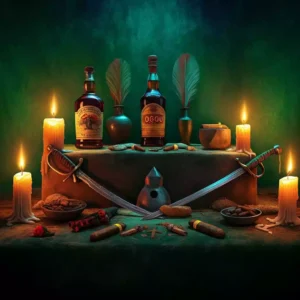
Ogou is drawn to offerings that highlight his deep connection to strength, fire, and productivity. Palms fronds, iron objects, and symbols of war like small machetes or swords are ideal for his altar. Food offerings like kola nuts, yams, red palm oil, and roasted meats reflect his earthy energy. He also appreciates rum and tobacco, further connecting him to celebrations of life’s vigor.
Tuesday is Ogou’s sacred day, making it the ideal time to set up an altar or offer sacrifices in his name. His favorite colors and symbols can amplify the energy of any ritual and help establish a stronger connection.
How to Work with Ogou
Building a relationship with Ogou starts with setting up a proper altar that reflects his strength and vibrancy. Place blacksmith tools, images of swords, and his favored foods on the altar. Incorporating colors like green and navy blue on this sacred space honors his presence.
Keep in mind that working with Ogou requires preparation and patience. Engage in rituals that reflect your intentions—whether seeking protection, healing, or guidance. Address him with honesty and respect, always remaining mindful of his fiery temperament.
Rituals and Practices
Working with Ogou often includes ceremonies rooted in fire, strength, and justice. A common protection ritual could include lighting candles to call on Ogou’s energy, while offering rum and tobacco to bind his strength to your cause. His guidance is particularly valuable in rituals dedicated to finding employment, resolving disputes, or seeking justice.
Cultural Significance of Ogou
Ogou holds a rightful place in Haiti’s history as a spirit closely tied to the fight for liberation. During the Haitian Revolution, Ogou was invoked as a powerful warrior who guided the enslaved population toward freedom. Today, his presence continues to motivate Haitian people as a symbol of leadership, justice, and truth.
Ogou’s Connection to Other Lwa
Relationships with Other Warrior Spirits
Ogou exists within a rich and interconnected spiritual landscape, sharing profound ties with other warrior spirits in the Voodoo pantheon. Among these are spirits such as Ezili Dantor, Baron Samedi, and others whose energies complement and sometimes challenge Ogou’s own. These relationships form a tapestry of power, justice, and protection, with each Lwa contributing to specific aspects of strength and leadership.
Ogou’s camaraderie with other warrior spirits is rooted in their shared purpose of safeguarding followers and assisting them in facing life’s challenges. Together, they represent different dimensions of power and resilience. For example, while Ogou’s fire and sword embody action and strategy in the heat of battle, other warrior spirits may focus on endurance, insight, or spiritual protection.
Through these relationships, Ogou showcases that leadership is not solitary—it is supported by collaboration and shared energies. These connections can teach followers that teamwork is as vital as individual strength, and that no single entity stands alone, even in the spiritual realm. Working with Ogou can also naturally open a devotee to the influence of other warrior spirits, adding layers of protection, strength, and wisdom to their spiritual practice.
The Feminine Counterparts of Ogou (e.g., Erzulie Dantor)
One of the most fascinating aspects of Ogou’s story lies in his relationships with feminine spirits, particularly Erzulie Dantor, who is often regarded as his wife. Erzulie Dantor is a fierce protector in her own right, a warrior spirit who represents feminine power, independence, and maternal strength. Together, Ogou and Erzulie Dantor form a dynamic duo that balances masculine and feminine energies, creating a partnership rooted in both strength and care.
Erzulie Dantor’s influence adds depth to Ogou’s character, tempering his fiery and often volatile energy with emotional depth and protection from a maternal perspective. Dantor’s fierce loyalty to her children and her unstoppable will to fight for their safety mirrors Ogou’s protective instincts. However, the two spirits also reflect the natural tensions that exist between love and war, compassion and fury, reminding followers of the delicate balance required to wield power responsibly.
Ogou’s possible connection to Oshun, the Yoruba goddess of love, beauty, and sensuality, also brings an added complexity to his story. Oshun’s charm and grace—a contrast to Ogou’s fiery nature—can be interpreted as a reminder to cultivate joy and beauty, even while navigating the demands of progress and leadership.
These feminine relationships highlight Ogou’s duality. While he is deeply masculine in his characteristics, his alliances with powerful feminine spirits emphasize the importance of balance. For devotees, this can be a deeply personal lesson about integrating assertiveness and compassion, strength and sensitivity, in their own lives.
Ogou’s Place in the Greater Pantheon
Ogou’s role in the Voodoo pantheon places him at a unique crossroads of power, innovation, and historical significance. He is part of the Nanchon Nago, a group of Lwa of African origin, particularly associated with the Yoruba people. Within this spiritual hierarchy, Ogou stands as a multifaceted figure who serves many purposes for his followers. He is both a protector and a leader, a force of justice and a symbol of resilience, reflecting the lived struggles and triumphs of Haitian history.
Ogou is not merely one Lwa among many; he plays a pivotal role in connecting the spiritual to the material, the past to the present. His mastery of iron and fire ties him to human progress, symbolizing the tools through which modern societies are built—even while war and destruction remain part of those narratives. His presence in Haitian Voodoo also reflects the adaptability of African spiritual traditions, transforming and flourishing even in the harshest conditions, like those endured by enslaved Africans.
Additionally, Ogou serves as a bridge between the divine and the earthy struggles of his devotees. His relationships with other Lwa align him with a larger spiritual network, ensuring that devotees who follow his path are never alone, even when navigating life’s most challenging battles. He holds space for justice and change, inspiring his followers to strive for better conditions not only for themselves but for their communities.
For followers of Haitian Voodoo, Ogou’s connection to the greater pantheon is an invitation to explore the multifaceted relationships within their spiritual practices. Learning about Ogou not only deepens one’s understanding of resilience and leadership but also opens the door to a greater appreciation of how interconnected the spirits are in providing guidance and support.
Lessons from Ogou
What Ogou Teaches About Strength and Resilience
Ogou’s story carries profound lessons about the boundless strength we possess when we channel our inner resolve. He is the embodiment of resilience, the unyielding force that encourages us to face challenges head-on, no matter how insurmountable they may seem. Ogou does not shy away from adversity, and his mythological battles and feats as a warrior symbolize the ability to rise after even the harshest struggles.
From Ogou, we learn that strength doesn’t just lie in physical might—it’s also found in the courage to endure, the wisdom to strategize, and the patience to persist. In life, hardships often seem overwhelming, but Ogou reminds us that within each of us exists the power to overcome whatever we face. Whether it’s rekindling hope during personal struggles or standing firm in the face of injustice, Ogou’s unwavering spirit teaches us to never surrender to despair.
His resilience also pairs with the lesson of rebuilding. Ogou’s connection to iron and fire reminds us that strength can be reforged. Just as metals are shaped through heat and hammering, we too can emerge stronger through the adversities that seek to batter us. Ogou shows that failures or setbacks aren’t the end; they are opportunities to grow tougher and wiser.
Ogou’s Perspective on Justice and War
Ogou doesn’t approach war lightly; as a spirit associated with both battle and protection, he understands the gravity of conflict. For Ogou, war is not an end in itself, but a means to achieve justice, fairness, and order when every other path has failed. His perspective on justice is one of balance—while he is quick to seek retribution when wronged, he also values fairness and deliberate thought.
Ogou’s teachings remind us that justice isn’t about petty revenge or reckless anger. Instead, it requires careful thought, patience, and action. He shows us that seeking justice is a noble path, but it must be rooted in a true desire to create fairness rather than destroy indiscriminately. To honor Ogou is to understand that fighting for what is right often requires strength of heart and discernment, alongside physical courage.
Furthermore, Ogou insists that leadership and justice go hand in hand. His role during the Haitian Revolution as a guiding spirit for liberation highlights that war, though devastating, can be a necessary tool in the battle for freedom and dignity. Through him, we learn that our causes must be just, and when we wield power, it must be in service of the greater good to ensure fairness for all, not just a select few.
Applying Ogou’s Wisdom in Everyday Life
Ogou’s lessons don’t end in mythology or rituals. They are powerful insights that can be incorporated into everyday life. First and foremost, Ogou inspires us to stay resilient no matter what challenges we face. When life seems overwhelming, we can call upon Ogou’s energy to ignite the power within us to keep going. His fiery energy reminds us to confront our fears and take bold action in the face of challenges.
When striving for justice in our lives—whether at work, within relationships, or in broader social contexts—Ogou urges us to approach injustice with integrity and tempered strength. For example, in workplace disputes, channeling Ogou might mean advocating for fairness while remaining calm, composed, and strategic. It’s not about acting out of rage but about standing firm, with clear intentions and thoughtful action.
Ogou also offers valuable advice on building strength through preparation. His connection to iron highlights the importance of having the right tools—both literal and metaphorical—for challenges ahead. This could mean learning new skills, arming yourself with knowledge, or building support networks to prepare for life’s obstacles. His lessons tell us to approach challenges not impulsively but with strategy, determination, and precision.
Finally, Ogou’s perspective on self-control is equally crucial. While his fiery energy is his strength, it also reminds us of the importance of balance. Allowing rage or frustration to take over can lead to costly mistakes or unnecessary destruction. Ogou urges us to temper our fire with self-awareness and discipline, ensuring we direct our energy toward constructive outcomes rather than recklessness.
Living with Ogou’s wisdom means walking through life with a strong heart, a sharp mind, and a spirit that refuses to be broken. Whether you’re facing personal hurdles or standing up for justice, Ogou’s teachings remind us that strength, resilience, and fairness are not just ideals—they are everyday practices that define who we are and what we stand for.
Cautions When Working with Ogou
Like any powerful force, Ogou must be approached with respect and understanding. His fiery nature requires discipline and thoughtful behavior. Potential missteps, such as ignoring his offerings or treating him casually, can lead to discord.
Frequently Asked Questions
- Can anyone work with Ogou? While Ogou is open to dedicated individuals, a respectful approach is essential.
- How do I know Ogou is present? Look for signs such as fiery sensations, the sound of clanging metal, or a powerful sense of courage.
- What are signs that Ogou is pleased or displeased? Positive outcomes in your efforts often indicate satisfaction, while setbacks may warrant reassessment.
Closing Thoughts
Ogou is both a protector and a fighter, embodying the very essence of resilience, progress, and justice. Whether you call upon him for guidance, strength, or healing, his energy reminds us that even in the darkest times, we can find the fortitude to move forward. By honoring Ogou, we honor our own ability to overcome and thrive.

